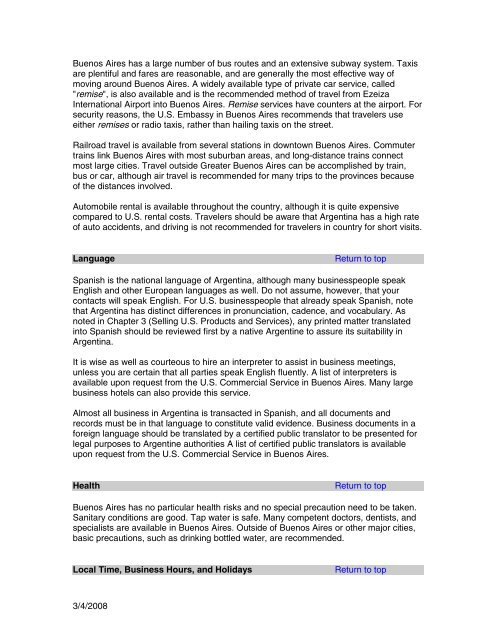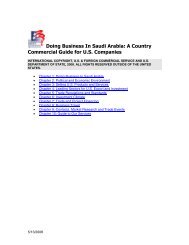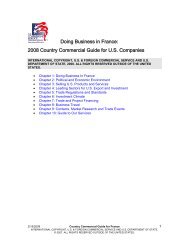Create successful ePaper yourself
Turn your PDF publications into a flip-book with our unique Google optimized e-Paper software.
Buenos Aires has a large number of bus routes and an extensive subway system. Taxis<br />
are plentiful and fares are reasonable, and are generally the most effective way of<br />
moving around Buenos Aires. A widely available type of private car service, called<br />
"remise", is also available and is the recommended method of travel from Ezeiza<br />
<strong>In</strong>ternational Airport into Buenos Aires. Remise services have counters at the airport. For<br />
security reasons, the U.S. Embassy in Buenos Aires recommends that travelers use<br />
either remises or radio taxis, rather than hailing taxis on the street.<br />
Railroad travel is available from several stations in downtown Buenos Aires. Commuter<br />
trains link Buenos Aires with most suburban areas, and long-distance trains connect<br />
most large cities. Travel outside Greater Buenos Aires can be accomplished by train,<br />
bus or car, although air travel is recommended for many trips to the provinces because<br />
of the distances involved.<br />
Automobile rental is available throughout the country, although it is quite expensive<br />
compared to U.S. rental costs. Travelers should be aware that <strong>Argentina</strong> has a high rate<br />
of auto accidents, and driving is not recommended for travelers in country for short visits.<br />
Language Return to top<br />
Spanish is the national language of <strong>Argentina</strong>, although many businesspeople speak<br />
English and other European languages as well. Do not assume, however, that your<br />
contacts will speak English. For U.S. businesspeople that already speak Spanish, note<br />
that <strong>Argentina</strong> has distinct differences in pronunciation, cadence, and vocabulary. As<br />
noted in Chapter 3 (Selling U.S. Products and Services), any printed matter translated<br />
into Spanish should be reviewed first by a native Argentine to assure its suitability in<br />
<strong>Argentina</strong>.<br />
It is wise as well as courteous to hire an interpreter to assist in business meetings,<br />
unless you are certain that all parties speak English fluently. A list of interpreters is<br />
available upon request from the U.S. Commercial Service in Buenos Aires. Many large<br />
business hotels can also provide this service.<br />
Almost all business in <strong>Argentina</strong> is transacted in Spanish, and all documents and<br />
records must be in that language to constitute valid evidence. <strong>Business</strong> documents in a<br />
foreign language should be translated by a certified public translator to be presented for<br />
legal purposes to Argentine authorities A list of certified public translators is available<br />
upon request from the U.S. Commercial Service in Buenos Aires.<br />
Health Return to top<br />
Buenos Aires has no particular health risks and no special precaution need to be taken.<br />
Sanitary conditions are good. Tap water is safe. Many competent doctors, dentists, and<br />
specialists are available in Buenos Aires. Outside of Buenos Aires or other major cities,<br />
basic precautions, such as drinking bottled water, are recommended.<br />
Local Time, <strong>Business</strong> Hours, and Holidays Return to top<br />
3/4/2008












